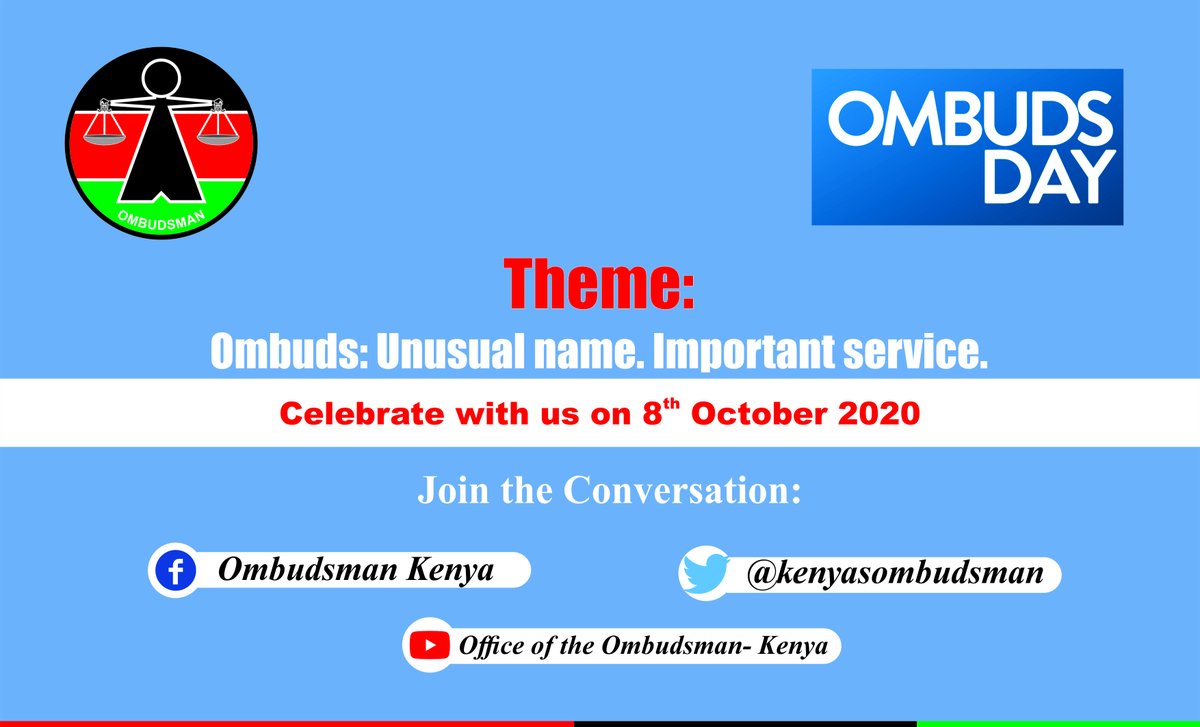
Today, Thursday 8 October we are celebrating #OmbudsDay where the theme for this year is "Unusual name. Important service" 

#OmbudsDay serves as an additional opportunity to educate and raise awareness among the public about the history and practices of the ombuds including the various ombuds models, the roles they play, the services they offer and the value provided.
Ombudsmen offices not only enhance the protection of individual rights,they also contribute to efficient public administration. Among government institutions, the ombudsman is uniquely positioned to identify and address structural problems within public administration #OmbudsDay
Ombudsmen offices promote and protect individual rights, encourage more efficient public administration, provide a cost-effective dispute resolution mechanism, bridge the gap between government and the public and allow increased citizen access to dispute resolution #OmbudsDay
Essentially a complaints-handling institution, the ombudsman office exists principally to help individuals resolve problems they may have with virtually any aspect of government #OmbudsDay
In fulfilling this function, the ombudsman office also helps society at large by promoting administrative reform and drawing attention to what are often systemic problems #OmbudsDay 

The origin of the ombudsman can be traced to Sweden when the Swedish King Charles XII signed a decree establishing the Hogste Ombudsmannen (the Highest Ombudsman) in October 1713 #OmbudsDay
The Highest Ombudsman was to make sure that state officers acted in accordance with the laws. The Highest Ombudsman would later metamorphose to what is now known as the Chancellor of Justice #OmbudsDay
On the other hand, the Swedish Parliamentary Ombudsman was formally established in 1809. The concept would then permeate first into the Scandinavian countries and ultimately to the rest of the world #OmbudsDay
Finland would adopt it in 1919, Norway in 1952 and Denmark in 1953. The rest of Europe and the world would then benefit from the concept with New Zealand being the first Commonwealth country to adopt the concept in 1962 #OmbudsDay
In Africa, Tanzania was the first country to adopt the concept when it established the Permanent Commission of Inquiry in 1967. Presently, the concept has been accepted in Africa with 75% of the countries having established the institution of the ombudsman #OmbudsDay
The establishment of the Office of the Ombudsman in Kenya can be traced back to 1971 when the Commission of Inquiry (Public Service Structure and Remuneration Commission), commonly known as the Ndegwa Commission, recommended that the office be established #OmbudsDay
This was primarily borne out of the need to address poor service delivery in the public sector occasioned by endemic institutional and systemic failures, and poor work ethic #OmbudsDay
In particular, service delivery in public institutions was characterized by undue delays, abuse of power, discourtesy, inefficiency, corruption, ineptitude, manifest injustice and misbehaviour among others #OmbudsDay
Although the intention was to improve service delivery by ensuring civil servants do not go against the law, the proposal was never implemented #OmbudsDay
The quality of service delivery in the public sector, therefore, continued to deteriorate thereby eroding public confidence and trust in public institutions and public servants #OmbudsDay
Despite the foregoing, a number of national Policy Documents and Institutional Reports continued to provide for the need to establish the Office of the Ombudsman in Kenya #OmbudsDay
According to the various Annual Reports of the Kenya Anti-Corruption Commission now @EACCKenya about 85 percent of the complaints received from the public were of administrative nature which could be effectively addressed by the Office of the Ombudsman #OmbudsDay
The Kenya Vision 2030 and the Economic Recovery Strategy also provided a basis for the establishment of such institution in Kenya to address poor governance in the public sector #OmbudsDay
Consequently, the President established the Public Complaints Standing Committee (PCSC) in 2007 through Gazette Notice Number 5826 of June 2007 as a Department within the then Ministry of Justice, National Cohesion and Constitutional Affairs #OmbudsDay
PCSC was mandated to enquire into allegations of misuse of office, corruption, and unethical conduct, breach of integrity, maladministration, delay, injustice, discourtesy, inattention, incompetence, misbehaviour, and inefficiency or ineptitude #OmbudsDay
PCSC was also mandated to receive, register, sort, classify and document all complaints against public officers in Ministries, State Corporations, Statutory Bodies and other public institutions #OmbudsDay
However PCSC lacked all the characteristics of the Office of Ombudsman due to the nature of its establishment and lack independence which affected its operations #OmbudsDay
The quest for an independent Ombudsman was given impetus by the implementation of the Agenda Four of the Kenya National Dialogue and Reconciliation through the adoption of a New Constitution in August 2010 in which administrative matters are given prominence #OmbudsDay
This culminated in the establishment of the Commission on Administrative Justice in September 2011 through the enactment of the CAJ Act, 2011 in the restructuring of the Kenya National Human Rights and Equality Commission under Article 59(4) of the Constitution #OmbudsDay
Since its establishment in November 2011, the Commission has received more than 500,000 complaints against public entities with a resolution rate of 83 per cent #OmbudsDay
@threadreaderapp compile.
• • •
Missing some Tweet in this thread? You can try to
force a refresh












